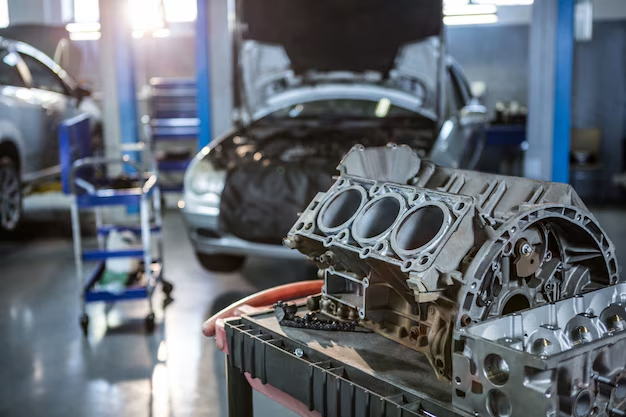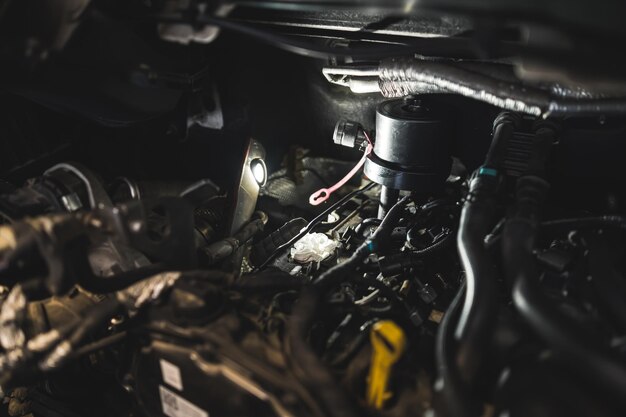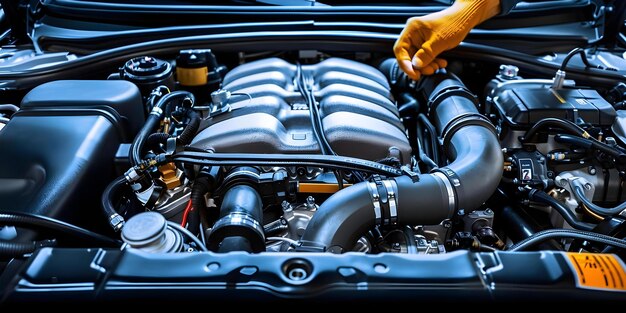
Engine Replacement:
Engine replacement is a major automotive repair that involves removing a malfunctioning or damaged engine from a vehicle and replacing it with a new, used, or rebuilt engine. This guide covers the reasons for engine replacement, the replacement process, types of replacement engines, costs, and tips for maintaining a replaced engine.
Reasons for Engine Replacement:
Several factors may necessitate an engine replacement:
A. Severe Engine Damage
Engines can suffer from severe damage due to neglect, accidents, or mechanical failures. Issues like a blown head gasket, damaged crankshaft, or broken timing belt can lead to irreparable engine damage.
B. High Mileage
As vehicles age, their engines experience wear and tear. High-mileage engines often lose performance and efficiency, leading many owners to consider replacement for better reliability.
C. Engine Seizure
An engine can seize when it runs out of oil or overheats, causing internal components to lock up. In such cases, the engine may need a complete replacement.
D. Cost of Repair vs. Replacement
Sometimes, the cost of repairing a failing engine can be more than the cost of a replacement. In these situations, it’s often more economical to replace the engine rather than attempt extensive repairs.


Costs of Engine Replacement
The cost of engine replacement can vary widely based on several factors:
New Engine: £3,000 to £8,000 or more, depending on the make and model.
Rebuilt Engine: £1,500 to £5,000, offering a more budget-friendly option.
Used Engine: £800 to £3,000, but costs can vary significantly based on mileage and condition.
Find the Perfect Fit for Your Budget
Choose from our range of flexible pricing options that cater to your specific needs.
Frequently Asked Questions
Find answers to commonly asked questions about our products and services.
What is engine replacement?
Engine replacement is the process of removing a cars faulty engine and replacing it with a new or refurbished engine. This may be necessary when the engine is too damaged for repair or when upgrading to a more powerful engine. This process can be complex and requires skilled mechanics to ensure proper installation and functionality.
How do I know if my engine needs replacing?
Signs that your engine may need replacement include excessive oil consumption, persistent knocking noises, overheating, or significant loss of power. If the engine warning light is illuminated and diagnostic tests show major issues, these are also indicators.
What are the costs associated with engine replacement?
The cost of engine replacement can vary widely depending on the make and model of the vehicle, the type of engine being installed, and labor charges. On average, engine replacement can range from £1,000 to £3,500 or more. Additional costs may arise if other components need repair or replacement during the process.
Is it better to replace an engine or buy a new car?
Deciding whether to replace an engine or buy a new car depends on various factors, including the age of the vehicle, its overall condition, and personal budget. If the car has a good history and is worth saving, an engine replacement can extend its life. Conversely, if the car has numerous other issues or high mileage, purchasing a new car might be a better investment.
How long does an engine replacement take?
The duration of an engine replacement can vary based on the vehicles make and model, as well as the mechanics expertise. Typically, it may take anywhere from a few days to a week. Factors such as parts availability, complexity of the job, and any unforeseen complications can also affect the timeline.
Can I replace my engine myself?
While you may be able to drive a car with minor issues, it is not advisable. Driving a vehicle that has significant problems can lead to further damage and safety hazards. Its best to have a health check performed to address any concerns.
What types of engines can be used for replacement?
For engine replacement, you can choose from several types, including new engines, remanufactured engines, and used engines. New engines come directly from manufacturers, while remanufactured engines are rebuilt to meet original specifications.
Will replacing my engine improve my car’s performance?
Replacing a worn-out or damaged engine can significantly enhance your cars performance, especially if you opt for a more powerful engine. A new or remanufactured engine can restore lost power and improve fuel efficiency. Additionally, if you choose a performance engine, it can enhance acceleration and overall driving experience.
How can I prepare for an engine replacement?
To prepare for an engine replacement, gather important documents such as your cars maintenance records and any warranty information. It’s also helpful to research different engine options and their costs. Setting a budget and selecting a reliable mechanic or repair shop will help ensure a smooth replacement process.
What are common problems after an engine replacement?
Common issues after an engine replacement can include oil leaks, overheating, and electrical problems if connections are not properly secured. Additionally, if the engine is not properly tuned or calibrated, it may lead to poor performance or fuel efficiency.
Can I drive my car with a bad engine?
Driving a car with a bad engine is not recommended, as it can lead to further damage and safety hazards. Signs of a bad engine, such as knocking noises, smoke, or overheating, indicate serious issues that require immediate attention.
How can I extend the life of my new engine?
To extend the life of a new engine, regular maintenance is key. This includes timely oil changes, checking fluid levels, and adhering to the manufacturers maintenance schedule. Additionally, driving habits, such as avoiding hard accelerations and maintaining a consistent speed, can help reduce wear and tear on the engine.
What are the signs of a failing engine?
Signs of a failing engine can include strange noises like knocking or tapping, a persistent check engine light, and smoke from the exhaust. Other indicators are poor fuel efficiency, vibrations, and difficulty starting the engine. Addressing these symptoms promptly with a mechanic can prevent further damage and costly repairs.
ENGINE REPLACEMENT Blogs
Top 10 Signs You Need Radiator Repair Birmingham
Top 10 signs you need radiator repair Birmingham. Learn how to spot…
Engine Replacement Cost: How Much to Replace a Car Engine and Save
Introduction Understanding the engine replacement cost is crucial before deciding to replace…
How to Replace a Car Engine: Step-by-Step Guide for DIY Engine Replacement
Introduction Learning how to replace a car engine can save you thousands…



